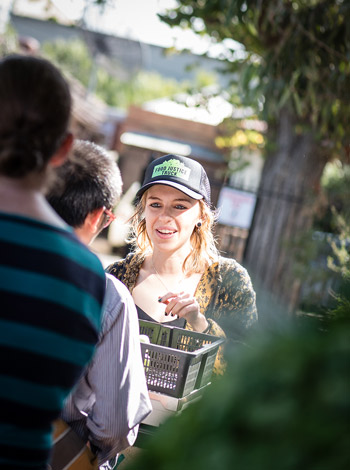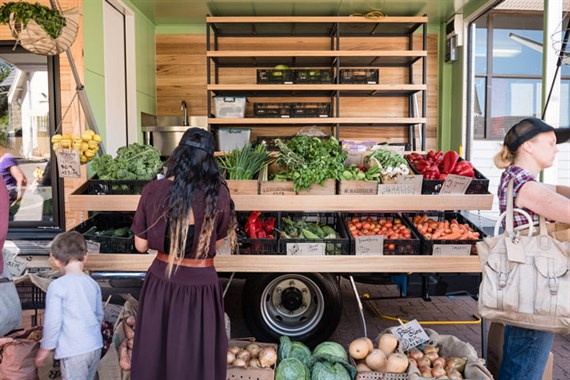-
In our series on philanthropy and the science of giving, BlueNotes talks to prominent figures and representatives of organisations about how they give, how they started and how they monitor their social impact.
Melbourne-based Asylum Seeker Resource Centre's partnership with the crowd-funding online platform StartSomeGood has raised $150,000 to fund a mobile food market selling food to asylum seekers at heavy discounts and to the general public at regular prices.
"They ask, 'What is the AS on the price tag? What's that cheap price about?' And we say that's for asylum seekers, here's what we're about."
Russell Shields, Food Justice Truck ManagerStaffed by volunteers and one paid manager, the ASRC's Food Justice Truck has been operating since March 2015 and was recently the joint-winner of the Social Enterprise Investment Award at the 2015 Social Enterprise Awards.
In the latest in our series, Food Justice Truck Manager Russell Shields spoke to Tracee Hutchison.
{CF_IMAGE}
Tracee Hutchison: What exactly is the Food Justice Truck?
Russell Shields: The Food Justice Truck is a mobile market that sells groceries and nutritious non-perishables items such as rice, grains and legumes to the general public, although we sell the same produce to asylum seekers at a 75 per cent discount.
The subsidised price, paid by the general public, allows that cost equation to happen. So the financial modelling allows us – in an ideal week – to break even.
It's a social enterprise. It's about people, not about profits. Everything we purchase we can tell you what farm it came from and what we paid.
So by shopping at the truck you're supporting Australian farmers, you're supporting a zero waste model and you're also enabling and improving the food security for people seeking asylum across Victoria.
The truck is clearly marked and branded as an asylum seeker resource centre project and as the customers come through they're asking about the truck and the issue.
They ask, “What is the AS on the price tag? What's that cheap price about?" And we say that's for asylum seekers, here's what we're about. So it gives us an opportunity to talk about the issue with people who may or may not have an understanding.
One of the greatest things we can do in life is talk about the issue and certainly breakdown any prejudices people have.
{CF_IMAGE}
TH: You funded the start up through an online crowd-funding model – why did you opt for that method of financing?
RS: The project was originally put to the Asylum Seeker Resource Centre Board by Patrick Lawrence, the ASRC Director of Humanitarian Services. He had this idea of a subsidised food truck to take the ASRC beyond its current core business.
We have over 1500 members that support the work we do, but there are over 12,000 asylum seekers throughout Victoria. So we wanted something to support asylum seekers across the community.
Patrick wrote a business plan that required $100,000 as a start up amount for the enterprise. The ASRC Board loved the idea but as a social enterprise they didn't think philanthropic donations – which funds the core business of supporting asylum seekers with medical, legal and other needs – should pay for it.
So Patrick work-shopped the idea and hit upon the crowd-funding model. The board said if you can raise the money through crowd-funding and you can have a community funded truck which will allow the enterprise to trade, go for it!
So late 2014 we worked with Start Some Good, the crowd-funding social enterprise website, and created the campaign. And we actually over-achieved our target – raising $150,000. We had 970 people donate to the campaign - everything from $20 to thousands of dollars - and from an idea, through a crowd-funding campaign, it turned into a reality.
TH: How did you get people to invest in the crowd funding campaign?
RS: At the time the ASRC had nearly 100,000 people on its Facebook page – it had a very strong social media and community support behind it.
That was clearly one of the enablers for the campaign. So whilst still only 1 per cent of the people from Facebook donated – having that mass to start with allowed us to promote the campaign using the social media channels, the connections within our community and networks of support we already had.
And the great thing is we have customers who come along who contributed. So since we've been open customers have come and said great, I donated to the campaign and I can now see the money I invested operating. And they can see the impact it is having and that is a wonderful thing.
TH: We're meeting today at the Footscray Primary School in Melbourne's inner West. How have you chosen the trading locations for the food truck?
RS: We choose our locations by where the greatest need is. So where are the most asylum seekers living across Melbourne and Victoria, matched with where our supporters are.
We need the general public to shop to enable us to subsidise the community we wish to support. So our first site is in the City of Maribrynong and the Footscray Primary School in Melbourne's western suburbs where we know there are a high number of asylum seekers families. We're here every Friday from 3pm to 7pm. The Principal, Phillip Fox, and the whole school community have been incredibly supportive.
We're about to roll out five new sites over the next few months which will be, again, the high target areas of the City of Dandenong, (south-east of Melbourne) which has the highest number of asylum seekers in Victoria, the City of Whittlesea, (outer north of Melbourne), it has the third highest number of asylum seekers in Victoria and inner city Melbourne suburbs as well.
So we're going to have a prominent presence in the City of Melbourne and we're looking at the inner northern suburbs like Brunswick and Fitzroy as well.

TH: What is your measure of success?
RS: Look, that is a really good question. What is success for us as the Asylum Seeker Resource Centre, what is success for us a truck and a social enterprise? So we have some clear measures of success that we track every week.
We see this as a public health intervention as well as a small business. So we have a very sophisticated sales system to track customer numbers into general public and asylum seekers – to track what they purchase.
So success for us is the number of asylum seekers that access our truck and the amount of food they're purchasing – because we know that fruit and veg and every nutritious item we have here is leading to healthier bodies.
We also, of course, have financial metrics. So for us success is remaining viable and sustainable. So if this truck is operating it means it's having the impact we want it to have. So it needs to be financially viable.
Success will be more sites, helping more people across more communities while not relying on philanthropic funding to keep us going so we can be a social enterprise in every essence of the words.
Success for us is also around interaction and engagement, so we track volunteer numbers, volunteer hours. We're working with the University of Melbourne, we have a masters in public health student doing a year long study into our program logic, into our evaluation framework which will lead to some more in depth qualitative studies around the people we're aiming to support.
So there's that evidence base to what we're doing, matched with the financial business of what we're doing.
TH: And have you got certain KPI's (key performance indicator) around what those statistics need to look like in terms of the percentage of asylum seekers against the percentage of general public shopping at the food truck to make it sustainable?
RS: Interesting, with 75 per cent against 25 per cent, in the middle is 50 per cent. Running the numbers as we have, literally the ratio is 50/50. We get 50 asylum seekers to 50 general public customers shopping on the same basket size.
We know on some sites we will absolutely lose money – but that's OK – because we know in others where the ratio of general public shoppers is a bit higher – it evens back out. So across a week, hopefully, those numbers balance out. And that's the exciting part.
It's what keeps us innovative and engaging as to how to we make it financial viable while trying to achieve the social purpose we have, because the two are both as important.
TH: The social-enterprise sector has traditionally looked to philanthropy, government partnerships and corporate social responsibility platforms for funding opportunities. Is crowd-funding changing that model?
RS: Crowd funding is really tapping the potential of people power. It's about giving people a choice.
So, while philanthropy may drive traditional funding in the not for profit sector into areas they particularly want to focus on, crowd funding allows you to target exactly what it is you want to do and hopefully the community will get behind it and support it.
It also allows the community to be really involved and invested in the project and the outcome.
I don't think crowd-funding will change the way social enterprise works. I think it's now part of the financing of new, emerging and existing social enterprises and I think it will grow in how much of a percentage it plays in that space. And time will tell.
In the food system movement we're seeing a very strong grass roots community movement coming through and that community movement is about people.
People can send things in all different directions so I think people power will continue to see an investment into crowd-funding. The data is certainly showing that it is growing across the social enterprise platforms which will make a change.
I don't think it will completely change the social enterprise space but I think it will create a great opportunity for people to have a go at new ideas.
So all of a sudden, I think the philanthropic world has opened up and it's a new space and it's an exciting space. For us as a medium to large not-for-profit organization, it allows us to connect with the community in a way that general philanthropy doesn't and allows us to try something innovative and creative.
To support the Food Justice Truck go to https://www.asrc.org.au/
Photographer: Tim Turner. Photo 3: Food Truck volunteer Elisa Ridout.
The views and opinions expressed in this communication are those of the author and may not necessarily state or reflect those of ANZ.
-
-
anzcomau:Bluenotes/social-and-economic-sustainability,anzcomau:Bluenotes/social-and-economic-sustainability/philanthropy,anzcomau:Bluenotes/social-and-economic-sustainability/opinion,anzcomau:Bluenotes/social-and-economic-sustainability/social-media
Food-truck philanthropy
2015-06-26
EDITOR'S PICKS
-
From nap rooms and free massages to ping pong tables and giant slides, innovative companies such as Google and Facebook offer amazing office perks and they do it for one simple reason: the value they get in return.
5 May 2015


